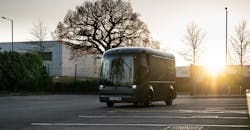Looking Deeper Into Microsoft and Arrival EV Collaboration
Electric vehicle (EV) manufacturer Arrrival announced late last week that it is co-developing digital fleet and vehicle capabilities for the automotive industry with Microsoft. This cloud-based approach using Microsoft Azure will enable advanced uses of telemetry, vehicle and fleet data management across vehicle fleets.
Why enter the collaboration?
Arrival President Avinash Rugoobur tells IndustryWeek, the company believes “collaboration is efficient - sharing costs and maximizing value. We are developing an exhaustive data model, which will describe the whole vehicle and structure the data in a logical way so it can be processed, and insights can be extracted to improve the future vehicle design, vehicle efficiency and user experience,” he says. “We already know the areas where sharing data is a must. An example of this is the autonomous driving domain. We have huge data sets, which you need to create, annotate and store.”
Rugoobur continues, “Secondly, the industry knows the examples of road scenarios, which are shared for many users for the validation of their systems and algorithms. Vehicle systems are more complex - the vehicle systems are unique and often made for specific applications but there's huge potential to make it a standard. The same way it may help the automotive industry in the future, it will open up the ecosystem, provide interchangeability and open market of parts.”Collaboration details
The companies plan to develop models to simplify the sharing of data within a mobility and freight ecosystem. These multi-tenant data ownership models will also increase the utility of shared data and serve as a foundation for multiple different stakeholders - including OEMs, suppliers, cities, and freight and logistics companies - to securely and responsibly analyze these swathes of data and apply valuable insights to their business. Arrival sees this as a crucial step considering the ever-increasing amount of data is produced and stored in the cloud by individual vehicles and fleets globally, but there is currently no standardized way of managing and utilizing that data flow.
This will provide these stakeholders full transparency and control over what data is shared and with who - enabling them to benefit from their data in ways never before possible. For example, this approach could allow easier access for an insurance company to process claims or set premiums to better understand and manage risk while remaining competitive in the market, or for cities to benefit from understanding more about traffic flows and how to collectively optimize the performance of transportation and freight providers.
The resulting open data platform will use Azure and machine learning to extract insights from the data, and edge computing to minimize vehicle-to-cloud data flow. By implementing a unified, canonical data standard and transparent data sharing policy, the insights drawn will enable improved vehicle designs, advanced fleet logistics and help spur advancements in mobility ecosystems and business models.
Arrival will be amongst the pioneers for this next generation of vehicle and fleet management and will demonstrate the many benefits of being able to manage and process data in this way. Its connected and intelligent vehicles combined with the development of new automotive capabilities will showcase best practice with regards to data management and analytics for this sector. Arrival will use data insights to increase the efficiency for its customers operations. Arrival will also be able to use the platform to share data with other partners looking to develop solutions based on those insights.
Differentiation through evolution
Arrival is becoming a pioneer in implementing these innovative technologies and building more digital products on top of the robust architecture, explains Rugoobur. “We believe there is an urgent need for greater policy coherence in data-sharing ecosystems and governments need to adopt a more collaborative approach toward policy making,” he says. Increasing digitization and data sharing in urban mobility can help governments and businesses to respond to this challenge and accelerate the transition toward sustainability.”
According to Rugoobur, Arrival’s mission is to provide cities with a multi-modal zero-emission transportation ecosystem that they require in order to meet their sustainability goals over the coming years. “This integrated transportation ecosystem will create cleaner, more equitable mobility solutions for people living in cities that Arrival believes will have a radical impact on their health and opportunities,” he says.
About the Author
Peter Fretty
Technology Editor
As a highly experienced journalist, Peter Fretty regularly covers advances in manufacturing, information technology, and software. He has written thousands of feature articles, cover stories, and white papers for an assortment of trade journals, business publications, and consumer magazines.

